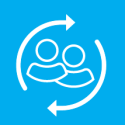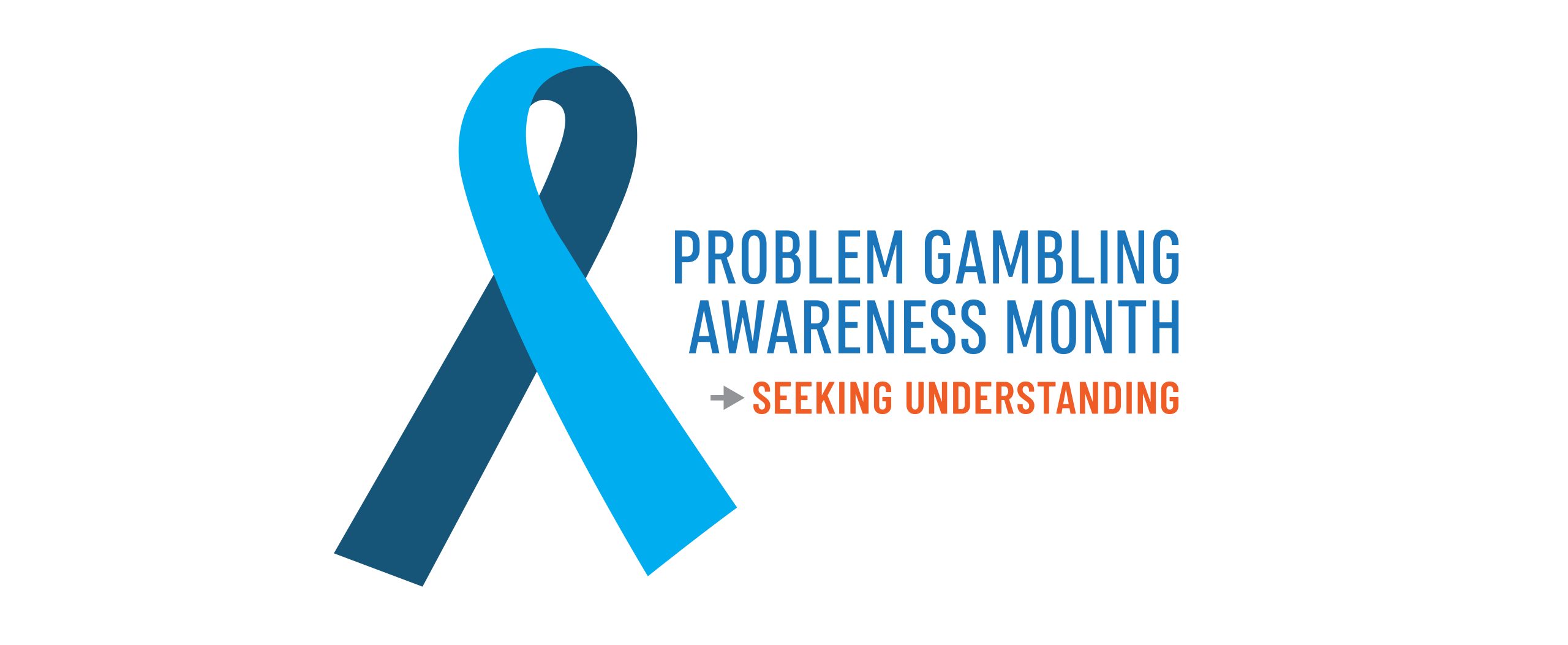The Overlooked Risk: Why Mental Health Providers Should Screen for Problem Gambling
Gambling might seem like a recreational activity for many, but for some, it can spiral into a destructive cycle that impacts mental health, relationships, and financial stability. Problem gambling often flies under the radar in mental and behavioral health settings, yet it is closely linked to depression, anxiety, substance use disorders, and suicidal ideation. Despite these connections, screening for gambling-related harm is often overlooked in clinical practice. Mental health providers are encouraged to review their client intake forms and incorporate screening for gambling-related risks as a standard part of their assessments.
Problem Gambling Awareness Month
Each March, we recognize Problem Gambling Awareness Month (PGAM). This year’s theme, “Seeking Understanding,” highlights the need to raise awareness of this serious yet often misunderstood mental health condition. The campaign seeks to foster greater awareness and empathy, break down barriers to treatment, and provide support for individuals and families impacted by gambling-related harm. The annual observance of Problem Gambling Awareness Month provides an essential platform for organizations across the country to highlight the availability of resources that support problem gambling prevention, education, treatment, and recovery. Additionally, March 11 is recognized as Problem Gambling Screening Day— a global event that encourages providers to screen for Gambling Disorder, helping to identify individuals who may need further assessment and support.
The Hidden Crisis
According to the National Council on Problem Gambling, an estimated 2.5 million U.S. adults (1%) meet the criteria for severe gambling problems in a given year. Another 5-8 million (2-3%) meet one or more of the criteria for gambling disorder and are experiencing problems due to their gambling behavior. It’s estimated that 6% of Nevada However, these numbers may be underreported due to stigma, lack of awareness, and limited screening in healthcare settings.
The National Council on Problem Gambling also estimates that the annual national social cost of problem gambling is $14 billion. These costs include job loss, bankruptcy, gambling-related healthcare spending, and other consequences. Many individuals with gambling problems present with co-occurring mental health or substance use disorders, making it easy for providers to miss the underlying issue. For instance, a client struggling with anxiety and financial stress may not openly disclose their gambling habits, yet excessive gambling could be a significant contributor to their distress. Without proper screening, these clients may not receive the support they need to address the root of their struggles.
Why Screening Matters

1. High Co-Occurrence with Other Disorders
Problem gambling frequently coexists with depression, anxiety, PTSD, and substance use disorders. Research suggests that individuals with gambling problems are at a higher risk of suicidal thoughts and behaviors. Identifying gambling-related issues early can improve treatment outcomes and prevent escalation.

2. Financial and Social Consequences
Unlike other addictions, gambling doesn’t have direct physical symptoms, but its consequences can be just as devastating. Mounting debt, relationship breakdowns, job loss, and legal troubles often accompany problem gambling. Screening can help providers recognize warning signs before these consequences become catastrophic.

3. Improving Client-Centered Care
Screening for problem gambling aligns with person-centered care by addressing the full spectrum of a client’s well-being. Many individuals struggling with gambling may not even realize their behavior has crossed the line into harmful territory. A simple conversation can open the door to self-awareness and treatment options.
DSM-5 Criteria for Gambling Disorder
The DSM-5 classifies gambling disorder as a behavioral addiction, characterized by persistent and recurrent problematic gambling behavior leading to significant impairment or distress. A diagnosis is made when a person exhibits four (or more) of the following criteria within a 12-month period:
- Needs to gamble with increasing amounts of money to achieve the desired excitement.
- Is restless or irritable when attempting to cut down or stop gambling.
- Has made repeated unsuccessful efforts to control, cut back, or stop gambling.
- Is often preoccupied with gambling (e.g., reliving past gambling experiences, planning the next venture, or thinking of ways to get money to gamble).
- Gambles when feeling distressed (e.g., helpless, guilty, anxious, or depressed).
- After losing money gambling, often returns another day to get even (“chasing” losses).
- Lies to conceal the extent of involvement with gambling.
- Has jeopardized or lost a significant relationship, job, or educational/career opportunity because of gambling.
- Relies on others to provide money to relieve desperate financial situations caused by gambling.
Standardized Screening Questions for Problem Gambling
The Brief Biosocial Gambling Screen (BBGS) is a widely used tool designed to assess the risk of gambling problems in individuals. Developed by researchers at Harvard Medical School’s Division on Addictions, this simple questionnaire helps identify individuals who may be at risk for developing gambling disorders, enabling early intervention and support. The BBGS focuses on key demographic and behavioral factors associated with problem gambling, providing a quick yet effective screening method for healthcare providers and counselors. Mental health professionals can integrate these evidence-based standardized screening questions into their assessments to identify potential gambling-related issues:
- During the past 12 months, have you become restless, irritable, or anxious when trying to stop/cut down on gambling?
- During the past 12 months, have you tried to keep your family or friends from knowing how much you gambled?
- During the past 12 months, did you have financial problems due to gambling that led to seeking help from others?
A single “yes” response suggests further evaluation for problem gambling is needed.
Practical Steps for Providers

1. Incorporate Standardized Screening Tools
Tools like the Brief Biosocial Gambling Screen (BBGS) can be easily integrated into intake assessments, providing a simple yet effective way to screen clients for gambling-related issues. Early identification through screening is crucial for addressing potential gambling disorders and connecting individuals with the appropriate support and resources.

2. Normalize the Conversation
Asking about gambling should be as routine as inquiring about substance use or mental health history. Framing questions in a nonjudgmental way—such as “Many people engage in gambling activities. Has gambling ever caused stress or challenges in your life?”—can encourage honesty.

3. Know Referral Resources
Providers should familiarize themselves national resources, such as the National Problem Gambling Helpline (1-800-GAMBLER) and state-funded treatment programs. Additionally, the Nevada Council on Problem Gambling, a nonprofit organization dedicated to raising awareness, promoting education, and advocating for quality treatment and support resources for problem gambling in Nevada, is a valuable resource. Another essential state of Nevada resource is Project Worth Nevada, an online, state-funded platform that connects Nevadans struggling with gambling problems to free and low-cost resources throughout the state, helping individuals find hope and support.

4. Join a LIVE Webinar and Earn CEUs
Join us for three insightful live webinars this March to enhance your understanding and skills in addressing gambling-related issues. On March 7, Second Chances: Formal Diversion Court for Gambling-Disordered Defendants will explore formal diversion courts and provide 1.5 CEUs. On March 13, The Intersection of Gambling and Opioid Use Disorder, in collaboration with the Nevada Opioid Center of Excellence, will examine the complex relationship between gambling and opioid use disorder and provide 2.0 CEUs. Finally, on March 20, Stress, Coping, and Suicidality in Problem Gamblers will focus on the mental health challenges faced by problem gamblers and provide 2.0 CEUs. These events offer valuable opportunities for continuing education, helping you better support clients facing these challenges.

5. Enroll in a Self-Paced Course and Earn CEUs
Take advantage of several self-paced courses to deepen your expertise in problem gambling counseling and support. The Problem Gambling Counselor Foundations course, presented by Rory Reid, PhD, LCSW, and Denise Quirk, MFT, LCADC, BACC-ICGC-II, CPGC-S, offers 30 CEUs and provides a comprehensive foundation in problem gambling counseling. For a more focused overview, Gambling Disorder Overview by Maureen Greeley, BS, and Tana Russell, SUDP, WSCGC-II, NCTTP, offers 2 CEUs. If you’re interested in screening, Screening for Gambling Problems: Why Addressing Client Gambling Behaviors Matter in Behavioral Health Care, presented by Jeffrey J. Marotta, PhD, and Mark Disselkoen, MSSW, LCSW, LCADC, provides 1 CEU with tools, resources, and best practices for gambling screening. The Sports Wagering and Gambling in the Online World course, presented by William “Ted” Hartwell, MA, covers the evolving landscape of sports betting and online gambling and offers 1.5 CEUs. For peer recovery support specialists, Introduction to Problem Gambling for Peer Recovery Support Specialists by Tana Russell offers 15 CEUs. Additionally, the Problem Gambling 30 Hour Advanced Course by Tana Russell, SUDP, WSCGC-II, NCTTP, CGT, provides in-depth training for those seeking advanced knowledge in the field. These courses are designed to be taken at your own pace, allowing you to gain valuable knowledge and earn continuing education credits.
Problem gambling is a silent but significant public health issue that deserves attention in mental and behavioral health settings. By incorporating gambling screenings into routine practice—especially on March 11, Problem Gambling Screening Day—providers can help clients address a hidden but impactful aspect of their well-being. The sooner problem gambling is identified, the better the chances of intervention and recovery. Mental health care is about seeing the whole person—let’s make sure we’re not missing a critical piece of the puzzle.
References
American Psychiatric Association. (2013). Diagnostic and statistical manual of mental disorders (5th ed.). American Psychiatric Publishing.
National Council on Problem Gambling. (2025). Problem Gambling Awareness Month. https://www.ncpgambling.org/problem-gambling/pgam/
Nevada Council on Problem Gambling. (2025). Understanding problem gambling. https://www.nevadacouncil.org/understanding-problem-gambling/
OpenAI. (2024). ChatGPT (Version 4) [AI language model]. Assisted in generating ideas and editing content for improved flow in the blog post on the importance of screening for problem gambling. Retrieved March 4, 2024, from https://chat.openai.com
Shaffer, H. J., & LaPlante, D. A. (2003). Brief biosocial gambling screen (BBGS) questionnaire. Harvard Medical School, Division on Addictions.
Blog Post Tags:
- List Item
Related Blog Posts
Related Learning Labs
Related Resources
.
- Buscar Tratamiento de Calidad para Trastornos de uso de Sustancia (Finding Quality Treatment for Substance Use Disorders Spanish Version)
- Finding Quality Treatment for Substance Use Disorders
- Focus On Prevention: Strategies and Programs to Prevent Substance Use
- Monthly Variation in Substance Use Initiation Among Full-Time College Students
- The National Survey on Drug Use and Health (NSDUH) Report: Monthly Variation in Substance Use Initiation Among Adolescents









